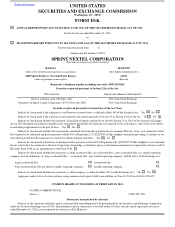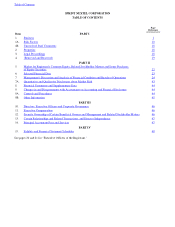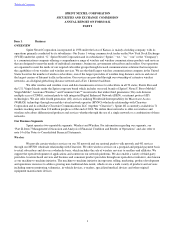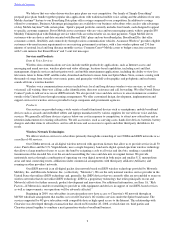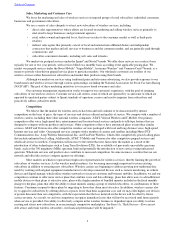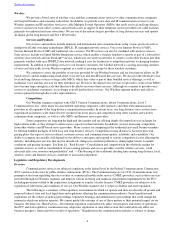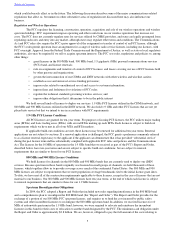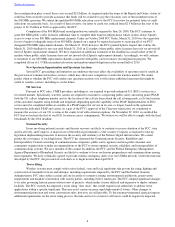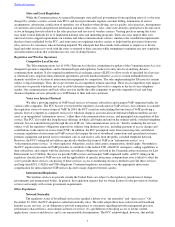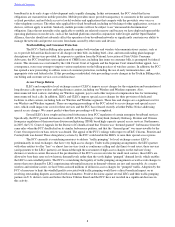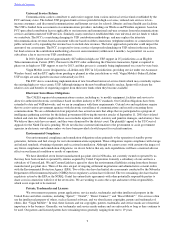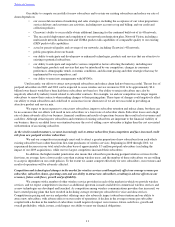Sprint - Nextel 2010 Annual Report Download - page 11
Download and view the complete annual report
Please find page 11 of the 2010 Sprint - Nextel annual report below. You can navigate through the pages in the report by either clicking on the pages listed below, or by using the keyword search tool below to find specific information within the annual report.
Universal Service Reform
Communications carriers contribute to and receive support from various universal service funds established by the
FCC and many states. The federal USF program funds services provided in high-cost areas, reduced-rate services to low-
income consumers, and discounted communications and Internet services for schools, libraries and rural health care facilities.
The USF is funded from assessments on communications providers, including our Wireless and Wireline segments, based on
FCC-prescribed contribution factors applicable to our interstate and international end-user revenues from telecommunications
services and interconnected VoIP services. Similarly, many states have established their own universal service funds to which
we contribute. The FCC is considering changing its USF contribution methodology, and may replace the interstate
telecommunications revenue-based assessment with one based on either connections (telephone numbers or connections to the
public network) or by expanding the revenue base to include data revenues. The latter approach in particular could impact the
amount of our assessments. The FCC is expected to issue a notice of proposed rulemaking on USF reform in the near future,
but final action on the contribution methodology does not seem imminent (within next 6 months). As permitted, we assess
subscribers a fee to recover our USF contributions.
In 2010, Sprint received approximately $47 million in high-cost USF support in 25 jurisdictions as an Eligible
Telecommunications Carrier (ETC). Pursuant to the FCC order authorizing the Clearwire transaction, Sprint is required to
phase out its high-cost USF support to zero by 2013, and that process is currently being implemented on a state-by-state basis.
Virgin Mobile is now designated as a Lifeline-only ETC in 22 jurisdictions, providing service under our Assurance
Wireless brand, and has ETC applications pending or planned in other jurisdictions as well. Virgin Mobile's Federal Lifeline
USF receipts are anticipated to increase substantially in 2011.
The FCC also is considering implementation of new broadband universal service funds which may eventually replace
the existing high-cost voice-centric USF. Although timing on the new broadband fund is unclear, Sprint will evaluate the
relative costs and benefits of requesting support from these new funds when they become available.
Electronic Surveillance Obligations
The CALEA requires telecommunications carriers, including us, to modify equipment, facilities and services to
allow for authorized electronic surveillance based on either industry or FCC standards. Our CALEA obligations have been
extended to data and VoIP networks, and we are in compliance with these requirements. Certain laws and regulations require
that we assist various government agencies with electronic surveillance of communications and records concerning those
communications. We are a defendant in four purported class action lawsuits that allege that we participated in a program of
intelligence gathering activities for the federal government following the terrorist attacks of September 11, 2001 that violated
federal and state law. Relief sought in these cases includes injunctive relief, statutory and punitive damages, and attorneys' fees.
We believe these suits have no merit, and they were dismissed by the district court. The plaintiffs' appeal to the US Court of
Appeals for the Ninth Circuit is pending. We do not disclose customer information to the government or assist government
agencies in electronic surveillance unless we have been provided a lawful request for such information.
Environmental Compliance
Our environmental compliance and remediation obligations relate primarily to the operation of standby power
generators, batteries and fuel storage for our telecommunications equipment. These obligations require compliance with storage
and related standards, obtaining of permits and occasional remediation. Although we cannot assess with certainty the impact of
any future compliance and remediation obligations, we do not believe that any such expenditures will have a material adverse
effect on our financial condition or results of operations.
We have identified seven former manufactured gas plant sites in Nebraska, not currently owned or operated by us,
that may have been owned or operated by entities acquired by Centel Corporation, formerly a subsidiary of ours and now a
subsidiary of CenturyLink. We and CenturyLink have agreed to share the environmental liabilities arising from these former
manufactured gas plant sites. Three of the sites are part of ongoing settlement negotiations and administrative consent orders
with the Environmental Protection Agency (EPA). Two of the sites have had initial site assessments conducted by the Nebraska
Department of Environmental Quality (NDEQ) but no regulatory actions have followed. The two remaining sites have had no
regulatory action by the EPA or the NDEQ. Centel has entered into agreements with other potentially responsible parties to
share costs in connection with five of the seven sites. We are working to assess the scope and nature of this responsibility,
which is not expected to be material.
Patents, Trademarks and Licenses
We own numerous patents, patent applications, service marks, trademarks and other intellectual property in the
United States and other countries, including “Sprint®,” “Nextel®,” “Direct Connect®,” and “Boost Mobile®.” Our services often
use the intellectual property of others, such as licensed software, and we often license copyrights, patents and trademarks of
others, like “Virgin Mobile®.” In total, these licenses and our copyrights, patents, trademarks and service marks are of material
importance to the business. Generally, our trademarks and service marks endure and are enforceable so long as they continue to
be used. Our patents and licensed patents have remaining terms generally ranging from one to 19 years.
Table of Contents
9

